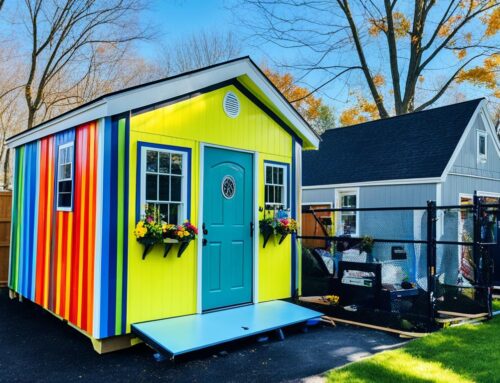Are you planning a construction project in Harbor Isle? Understanding the importance of building permits, variances, and radius maps is essential for a smooth and successful development process. At TracisPermits.com, we offer fast and efficient services to help you obtain the necessary permits and maps in Harbor Isle.
Key Takeaways:
- Building permits, variances, and radius maps are crucial for navigating the development process in Harbor Isle.
- Obtain building permits to ensure compliance with local building codes and regulations.
- Apply for variances if you need to deviate from certain zoning regulations.
- Access radius maps to determine property boundaries and proximity to landmarks or infrastructure.
- Familiarize yourself with the permit application process, including required documents and fees.
Get building permits, variances, maps & COs quickly on Long Island! Call 631-492-0927 for fast service at TracisPermits.com.
Applying for Building Permits in Harbor Isle
When undertaking a construction project in Harbor Isle, it is crucial to navigate the building permit application process successfully. The Island County Planning Department oversees the entire process, ensuring compliance with local building codes and regulations. To apply for a building permit, there are several steps you need to follow.
1. Submit a Site Address Application
The first step in the permit application process is to submit a site address application to the Island County Planning Department. This application provides essential information about the project location and helps the department identify the property accurately.
2. Obtain Necessary Permits
In addition to the building permit, there are several other permits you may need to obtain depending on the nature of your project. These include:
- Permits issued by the Island County Public Works Department for approved access to the property.
- A Water Availability Verification (WAV) form from the Island County Health Department to verify water availability for the project.
- An as-built or approved septic permit from the Island County Health Department or the applicable sewer district.
- A land-use permit application to the Island County Planning Department for variances or other land development approvals.
3. Consider Special Requirements
Depending on the location of your property, there may be additional requirements to consider. If your property is located within a floodplain, you need to pay attention to flood development permit requirements. Similarly, if your property is within 200 feet of the Ordinary High Water Mark, you must ensure compliance with shoreline regulations.
4. Prepare a Comprehensive Plan
Before submitting your application, it is essential to prepare a detailed plot or site plan that includes all the relevant information. This plan should indicate details such as water and septic lines, existing buildings, and proposed construction. It helps the Island County Planning Department review your application accurately and efficiently.
| Permit Type | Application Process | Required Documents |
|---|---|---|
| Building Permit | Submit a site address application to the Island County Planning Department. | Site address application |
| Access Permit | Obtain permits issued by the Island County Public Works Department for approved access to the property. | Permits issued by the Island County Public Works Department |
| Water Availability Verification | Obtain a Water Availability Verification (WAV) form from the Island County Health Department. | Water Availability Verification (WAV) form |
| Septic Permit | Apply for an as-built or approved septic permit from the Island County Health Department or applicable sewer district. | As-built or approved septic permit |
| Land-Use Permit | Submit a land-use permit application to the Island County Planning Department. | Land-use permit application |
Understanding Permit Fees and Valuation in Harbor Isle
When undertaking a construction project in Harbor Isle, it is important to have a clear understanding of the permit fees and valuation process. Building permit fees are calculated based on the total valuation of the construction project. The valuation includes the cost of materials, labor, and other expenses associated with the construction.
To estimate the building permit fees, you can refer to the fee schedule provided by the Island County Planning Department. This fee schedule provides detailed information on the fees for building permits, plumbing and mechanical permits, as well as the Building Stock Plans Policy. It is essential to review these schedules to ensure accurate estimation of the permit fees.
In addition to building permits, plumbing and mechanical permits also have separate fee schedules. The fees for these permits depend on the scope of work involved in the project. It is important to consider these fees when budgeting for your construction project in Harbor Isle.
| Permit Type | Fee |
|---|---|
| Building Permit | $X |
| Plumbing Permit | $X |
| Mechanical Permit | $X |
“Understanding the permit fees and valuation process is essential for planning and budgeting your construction project in Harbor Isle. By reviewing the fee schedules provided by the Island County Planning Department, you can estimate the cost of building permits and ensure compliance with the necessary regulations.”
Construction Permits and Resources in St. Pete
When it comes to construction projects in St. Pete, access to permits and resources is essential for a smooth and successful process. The Construction Services and Permitting Division in St. Pete plays a crucial role in facilitating development and ensuring compliance with minimum code standards. With the help of online permits and a variety of resources, builders can navigate the construction process more efficiently.
The St. Pete Building & Permitting portal provides convenient access to online permits and allows for easy tracking of permit status. This digital platform streamlines the permit application process, saving time and effort for builders. By utilizing this online service, builders can submit and monitor permit applications from the comfort of their own offices or job sites.
Additionally, the Construction Services and Permitting Division offers a wealth of resources to support builders in St. Pete. Building guides and checklists are available to provide step-by-step guidance through the construction process. These resources help ensure that builders have the necessary knowledge and documentation to proceed with their projects compliantly and efficiently.
Building Guides and Checklists
Building guides and checklists serve as valuable tools for builders in St. Pete. These resources provide detailed information on various aspects of construction, such as permit requirements, documentation needed for plan review, and inspection procedures. By following these guides and checklists, builders can stay organized and ensure that all necessary steps are completed accurately and on time.
Overall, the Construction Services and Permitting Division in St. Pete offers a comprehensive range of resources and online permit services to support builders in their construction projects. By taking advantage of these resources, builders can navigate the permitting process more efficiently, comply with building codes, and ensure the successful completion of their projects.
Inspections and Certificates in Construction Projects
When undertaking a construction project, inspections and certificates play a crucial role in ensuring compliance with building codes and safety standards. These processes ensure that construction work is done properly and that the completed project meets all necessary requirements. Below, we will discuss the various inspections and certificates involved in construction projects.
Inspections
Inspections are conducted at different stages of the construction process to ensure that the work being carried out meets the necessary standards. Common inspections include:
- Footing inspections
- Under slab inspections (if applicable)
- Foundation inspections for wood frame construction
- Building framing inspections
- Rough-in inspections
- Insulation inspections
- Fire protection inspections
These inspections cover various aspects of the construction process, such as the strength and stability of the foundation, the integrity of the framing, and the compliance with fire safety regulations. Inspections are conducted by qualified inspectors who thoroughly assess the construction work to ensure it meets the required standards.
Certificates
Certificates are an essential part of the construction process and demonstrate compliance with regulations and codes. The certificate of occupancy, for example, is required for new construction, changes in property use, and remodeling projects. This certificate confirms that the construction project meets the necessary safety and building code requirements and is safe for occupancy.
In addition to the certificate of occupancy, other certificates may be required depending on the specific project and location. For properties located in flood hazard areas, an elevation certificate is necessary to determine the property’s elevation in relation to the base flood elevation. This certificate helps determine insurance rates and ensures compliance with floodplain management regulations.
It is important to understand the inspection and certification requirements specific to your construction project and location. Adhering to these requirements will ensure the safety and compliance of your construction project.
Inspection Process in North Carolina
When it comes to construction projects in North Carolina, the inspection process follows a standardized approach to ensure compliance with building codes and safety standards. Each stage of construction requires specific inspections to be carried out by the inspection department. Let’s take a closer look at the various types of inspections that are conducted throughout the construction process:
Footing Inspection
The first inspection that takes place is the footing inspection. This inspection occurs before concrete placement and ensures that the excavation, reinforcing steel, and formwork for the footings are properly prepared. It ensures a solid foundation for the structure.
Under Slab Inspection
If applicable, under slab inspections are conducted after the completion of materials and equipment that will be concealed by concrete. This inspection ensures that all necessary components, such as plumbing or electrical lines, are properly installed before the concrete is poured.
Foundation Inspection
For wood frame construction, foundation inspections focus on ensuring the foundation supports, crawl space leveling, ground clearance, and positive drainage are in compliance with building codes. This inspection ensures the stability and integrity of the foundation.
Building Framing Inspection
Building framing inspections cover the roof, wall, ceiling, and floor framing. During this inspection, the inspector checks for proper framing, including necessary blocking, bracing, and fire stopping. It ensures the structural integrity and safety of the building.
Rough-in Inspection
Rough-in inspections are conducted when concealed components of electrical, plumbing, fire protection, or HVAC systems are visible for inspection. This inspection ensures that all rough-in work is completed according to code before further work is concealed.
Insulation Inspection
After framing, rough-in inspections, and installation of the permanent roof covering, insulation inspections take place. The inspector checks for proper insulation and vapor retarders, ensuring energy efficiency and comfort in the building.
Fire Protection Inspection
Fire protection inspections are required when fire protection materials are used in the construction. The inspector ensures that all fire safety measures, such as fire-resistant materials and fire suppression systems, are properly installed and comply with regulations.
Final Inspection
Once all the authorized work is completed, a final inspection is conducted for each trade involved in the construction project. This inspection ensures that the project complies with all applicable building codes and regulations and is ready for occupancy.
By following this standardized inspection process, North Carolina ensures that construction projects meet safety standards and are built to code.
Conclusion
In conclusion, navigating the development process in Harbor Isle requires a thorough understanding of building permits, variances, and radius maps. These essential components ensure compliance with local building codes, zoning regulations, and provide valuable information about property boundaries and proximity to landmarks or infrastructure.
To apply for building permits in Harbor Isle, you need to follow a comprehensive permit application process overseen by the Island County Planning Department. This includes submitting various applications to different departments, such as the Island County Public Works Department and the Island County Health Department. Additionally, you must pay attention to specific requirements like flood development permits and shoreline regulations.
Understanding permit fees and valuation is also vital when planning your construction project in Harbor Isle. The Island County Planning Department provides a fee schedule that estimates the cost of your building permit based on the project’s valuation. It’s essential to refer to these schedules and policies to ensure accurate budgeting.
If you’re in Long Island and need fast and efficient services for obtaining building permits, variances, maps, and certificates of occupancy, contact TracisPermits.com at 631-492-0927. Their team is dedicated to providing quick and reliable assistance throughout the permitting process.
FAQ
What documents and permits are needed for construction projects in Harbor Isle?
Building permits, variances, and radius maps are crucial for navigating the development process in Harbor Isle.
Why is it important to obtain building permits?
Building permits ensure compliance with local building codes and regulations.
When should I apply for variances?
Apply for variances if you need to deviate from certain zoning regulations.
How can I access radius maps?
Access radius maps to determine property boundaries and proximity to landmarks or infrastructure.
What is the permit application process like in Harbor Isle?
Familiarize yourself with the permit application process, including required documents and fees.
Where can I obtain building permits, variances, and maps in Harbor Isle?
TracisPermits.com offers fast and efficient services for obtaining building permits, variances, maps, and certificates of occupancy in Harbor Isle.
Who oversees the building permit application process in Harbor Isle?
The building permit application process in Harbor Isle is overseen by the Island County Planning Department.
How do I apply for a building permit?
To apply for a building permit, you will need to submit a site address application to the planning department.
Where can I find permits issued by the Island County Public Works Department?
Access permits issued by the Island County Public Works Department for approved access to the property.
How can I verify water availability for my construction project?
Obtain a Water Availability Verification (WAV) form from the Island County Health Department to verify water availability for the project.
How do I obtain a septic permit?
Apply for an as-built or approved septic permit from the Island County Health Department or the applicable sewer district.
Where do I submit a land-use permit application?
Submit a land-use permit application to the Island County Planning Department for variances or other land development approvals.
Are there any special permit requirements for properties in floodplains?
Pay attention to flood development permit requirements if your property is located within a floodplain.
What regulations should I be aware of if my property is close to water?
Ensure compliance with shoreline regulations if your property is within 200 feet of the Ordinary High Water Mark.
What should be included in a plot/site plan?
Prepare a plot/site plan indicating relevant details such as water and septic lines, existing buildings, and proposed construction.
Do I need to sign an Owner Contractor Form if I’m not using a licensed WA State Contractor?
If you’re not using a licensed WA State Contractor, sign an Owner Contractor Form.
How are building permit fees estimated in Harbor Isle?
Building permit fees in Harbor Isle are estimated based on the valuation of the construction project.
Where can I find detailed information on building permit fees?
The fee schedule provided by the Island County Planning Department can help estimate the cost of the building permit. Refer to the Building Permit Fee Schedule, Plumbing and Mechanical Permit Fee Schedule, and Building Stock Plans Policy for detailed information on fees.
How is the valuation of the project determined for permit fees?
Valuation of the project is determined based on the total cost of materials, labor, and other construction expenses.
Do plumbing and mechanical permits have separate fee schedules?
Yes, plumbing and mechanical permits also have separate fee schedules depending on the scope of work.
Can I use building stock plans for my project?
Building stock plans can be used for certain types of projects, but new stock plan processes are required with each new Building Code cycle.
Where can I find construction permits and resources in St. Pete?
The Construction Services and Permitting Division in St. Pete facilitates the development process and ensures compliance with minimum code standards. Online permits and status tracking are available through the St. Pete Building & Permitting portal.
Are there any resources available to assist builders in the construction process?
Yes, building guides and checklists are available to assist builders in the construction process.
What is the plan review process for obtaining a building permit?
The plan review process includes submitting a building permit application form and relevant forms along with the construction plans. Preliminary plan review is an optional service for design professionals to discuss projects before official plan submission. St. Pete offers an ePlan Review process for electronic plan submissions, providing a streamlined and efficient submittal process.
Are there any expedited processes for affordable housing projects?
Yes, affordable housing projects have expedited building plan review and permitting procedures.
What types of inspections are commonly conducted in construction projects?
Inspections play a crucial role in construction projects to ensure compliance with building codes and safety standards. Common inspections include footing inspections, under slab inspections (if applicable), foundation inspections for wood frame construction, building framing inspections, rough-in inspections, insulation inspections, and fire protection inspections.
When are final inspections conducted in a construction project?
Final inspections are conducted for each trade to ensure completion of authorized work before issuing a certificate of occupancy.
When is a certificate of occupancy required?
The certificate of occupancy is required for new construction, changes in single-family residential property, changes of use, remodeling condemned buildings, and more.
Are temporary certificates of occupancy available for delayed projects?
Yes, temporary certificates of occupancy are offered for projects with scheduling delays not related to life safety.
What is a certificate of completion used for?
A certificate of completion is required for completed construction projects, particularly for the shell of a building.
Are elevation certificates necessary for properties located in flood hazard areas?
Yes, elevation certificates are necessary for properties located in flood hazard areas.
How does the inspection process work in North Carolina?
The inspection department in North Carolina follows a standardized process for inspections in construction projects. Inspections are conducted at different stages of the project to ensure compliance with building codes and safety standards.
What is checked during a footing inspection?
Footing inspections are conducted before concrete placement, ensuring proper excavation, reinforcing steel, and formwork.
When is an under slab inspection conducted?
Under slab inspections (if applicable) occur after completing materials and equipment that will be concealed by concrete.
What is checked during a foundation inspection for wood frame construction?
Foundation inspections for wood frame construction focus on foundation supports, crawl space leveling, ground clearance, and positive drainage.
What is covered in a building framing inspection?
Building framing inspections cover roof, wall, ceiling, and floor framing, with necessary blocking, bracing, and fire stopping in place.
What is the purpose of a rough-in inspection?
Rough-in inspections are conducted when concealed components of electrical, plumbing, fire protection, or HVAC systems are visible for inspection.
When is an insulation inspection conducted?
Insulation inspections occur after framing, rough-in inspections, and installation of permanent roof covering, with insulation and vapor retarders in place.
What is checked during a fire protection inspection?
Fire protection inspections are required when fire protection materials are used, ensuring compliance with fire safety standards.
What is the purpose of a final inspection?
Final inspections are done for each trade to approve the completion of authorized work.












